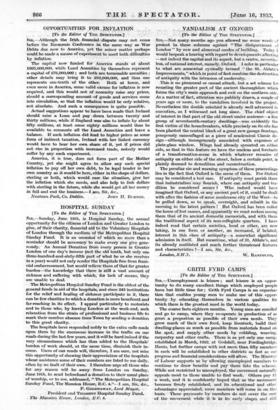VANDALISM AT OXFORD • - {To-the Editor of THE SPP.CTATOR.]
.
Sin,—Not many months ago you allowed me some words of protest in these columns against "The -disfigurement of London " by new and abnormal modes of building. Today I would bespeak a hearing with regard to developments affecting —not indeed the capital and its aspect, but-a centre, neverthe- less, of national interest, namely, Oxford. I-refer in particular to what are somewhat cynically termed " the St. ,Aldates Improvements," which in point of fact combine the destruction of antiquity with the intrusion- of modernity.
This is no piecemeal or casual attack, but a set scheme for recasting the greater part of the ancient thoroughfare which forms the city's main approach and exit on the southern side: Asa matter of fact, attention was -publicly drawn, a couple of years ago or more, to the vandalism involved in the project. Nevertheless the double -mischief is already well advanced in execution, as. I witnessed not long since. The chief object of interest in that part of the old street under sentence—a fine group of seventeenth-century dwellings—was -evidently the first victim of the housebreakers, while precisely on its-site.has been planted the central block of a great new garage frontage; pompously camouflaged as a piece of academical Classic de- sign—although incongruously associated with expanses of plate-glass window. Wings had already sprouted on either side, so that in this feature we have the nucleus and foretaste of a transformation-scene in which whatever remains of antiquity on either side of the street, below a certain point, is plainly doomed to demolition and reconstruction.
The peculiar sin and warning symptom of these proceedings lies in the fact that Oxford is the scene of them. For Oxford may be considered a test case. If antiquity must perish there that industrialism' may flourish, where can antiquity and tra- dition be considered secure ? Who indeed would have imagined that Oxford, or any ancient part of it, could be dealt with after the fashion of some mushroom city of the West—to be pulled down, so to speak, overnight, and rebuilt in the morning to the latest pattern ! But Oxford has been called the home of lost causes, and apparently we must reckon among them that of its ancient domestic memorials, and with them the traditional aspect of its non-collegiate quarters. I have indeed read that certain societies, local or other, are now taking, in one form or another, an increased, if belated, interest in this class of antiquity—a somewhat significant admission in itself. But meantime, what of St. Aldate's, and its already mutilated and much further threatened features and characteristics ?—I am, Sir, &c.,










































 Previous page
Previous page